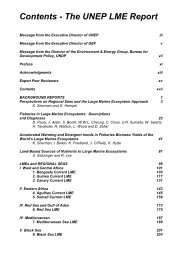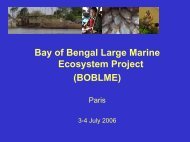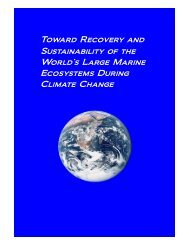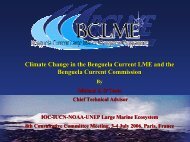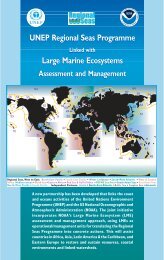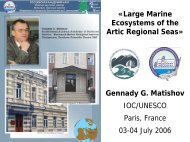Sustaining the World's Large Marine Ecosystems
Sustaining the World's Large Marine Ecosystems
Sustaining the World's Large Marine Ecosystems
Create successful ePaper yourself
Turn your PDF publications into a flip-book with our unique Google optimized e-Paper software.
establishment of marine protected areas, <strong>the</strong> restoration of environmentally<br />
degraded areas, and <strong>the</strong> conservation of biological diversity. The Commission<br />
will also adopt regulatory frameworks on <strong>the</strong> discharge of sewage, pollutants and<br />
o<strong>the</strong>r waste matter, and provide guidelines on water quality standards.<br />
The interim agreement of <strong>the</strong> BCC was formally signed in August 2006 by <strong>the</strong><br />
Namibia ministers of Fisheries and <strong>Marine</strong> Resources, Environment and Tourism<br />
and Mines and Energy, and by <strong>the</strong> South Africa Minister for Environmental Affairs<br />
and Tourism. The agreement was subsequently signed by <strong>the</strong> Angola ministers<br />
of Fisheries, Urbanism, <strong>the</strong> Environment and Petroleum in Luanda in January<br />
2007. The first meeting of <strong>the</strong> Ministerial Conference of <strong>the</strong> BCC was held in<br />
Windhoek in July 2007.<br />
LEARNING FROM EXPERIENCE<br />
Our knowledge and understanding of <strong>the</strong> dynamics and functioning of <strong>the</strong><br />
Benguela Current ecosystem has advanced substantially. Angola, Namibia and<br />
South Africa have taken significant strides towards meeting <strong>the</strong> targets set for<br />
fisheries and <strong>the</strong> environment at <strong>the</strong> Johannesburg World Summit for Sustainable<br />
Development in 2002. Regional research institutes, universities, and consultancy<br />
groups have worked closely to build regional scientific research and management<br />
capacity and to ga<strong>the</strong>r and analyse a wide range of information that is vital for <strong>the</strong><br />
responsible management of <strong>the</strong> LME and its natural resources. Management<br />
tools have been developed and recommendations made that translate policy into<br />
actions. Much of <strong>the</strong> work has been transboundary in nature and has contributed<br />
to our knowledge of <strong>the</strong> Benguela Current and how best to rebuild, conserve and<br />
manage its resources.<br />
Support and encouragement by NOAA, <strong>the</strong> IUCN, <strong>the</strong> IOC/UNESCO and UNEP<br />
provided to o<strong>the</strong>r LMEs world-wide through <strong>the</strong> annual LME consultative<br />
committee meetings in Paris, was of great assistance in achieving our objectives.<br />
The partnership with FAO in developing an ecosystem approach to fisheries<br />
(EAF) in <strong>the</strong> region also played a key role in building confidence and empowering<br />
fisheries agencies to broaden <strong>the</strong>ir perspective and approach to fisheries<br />
management.<br />
In <strong>the</strong> last five years, <strong>the</strong> BCLME project has forged strong links with <strong>the</strong> GEFsupported<br />
Guinea Current, Canary Current, and Agulhas and Somali Current<br />
LME projects through consultative meetings, training, capacity building activities,<br />
shared transboundary fisheries, pollution surveys, and regional workshops.<br />
Close cooperation was also developed with <strong>the</strong> Global Ocean Observation<br />
System (GOOS) through GOOS-Africa, which led to strong partnerships in<br />
building capacity and training in operational oceanography and ocean monitoring<br />
systems particularly satellite remote sensing. A highlight of this cooperation was<br />
<strong>the</strong> Pan-African Forum on <strong>Large</strong> <strong>Marine</strong> <strong>Ecosystems</strong> held in Cape Town in<br />
59



